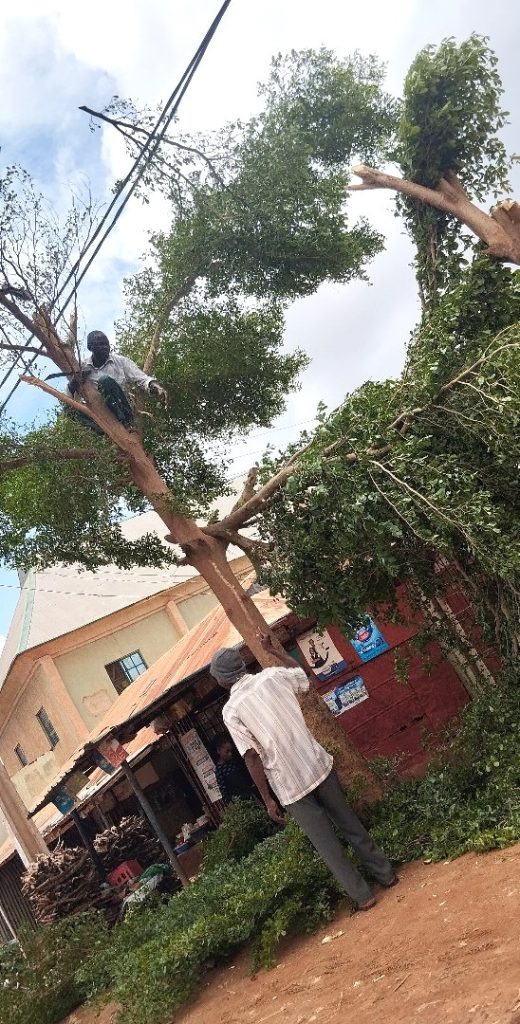ASHENEWS reports that despite a 1996 law prohibiting the cutting down of trees in Sokoto State, rampant deforestation persists without any significant consequences. This is due to the government’s lack of sensitization to the people.
By Gift Ovuede
A 67-year-old resident of the Gidan Salanke area, who requested anonymity, recounted how a dense canopy of trees once shaded the region. This greenery provided respite from the heat for many years, but activities like farming and construction have led to widespread tree felling.
“We used to enjoy coolness when we had the trees, but now we experience hot weather since there are no more trees to cover us,” he lamented. “The cutting down of trees may not stop if nothing is done by the government because daily, people are erecting buildings and constructing roads, and more trees are cut down without replacement.” He added that he, along with many others, is unaware of the 1996 law which prohibits tree cutting, highlighting a huge gap in public awareness.
Sokoto is one of the 11 frontline states in Nigeria severely impacted by desertification. The advancing desert threatens agricultural productivity, biodiversity, and the livelihoods of many residents, exacerbating the region’s harsh climatic conditions and making it more prone to droughts and extreme heat. This environmental crisis underscores the urgent need for effective action to preserve and expand tree cover in the state.
Ahmed Abubakar Giyawa, Director of Forestry at the Ministry of Environment in Sokoto State, in an interview with our reporter, said that annually, the state government organizes a tree-planting campaign called the Tree Planting Campaign (TPC). This campaign involves a ceremony where the state governor and other dignitaries flag off the tree-planting exercise and conduct a sensitization campaign to educate the public on the importance of tree planting.

“The Sokoto State governor has approved the production and distribution of one million tree seedlings across the state to be planted out of the planned five million tree seedlings to be planted this year,” Giyawa said. “The state government plans on partnering with international organizations like Surge Africa and the Great Green Wall (GGW) to avert desertification and make Sokoto State weather-friendly and habitable for its people.”
Giyawa also emphasized the enforcement of Forestry Law Number 7, 1996, which prohibits tree-cutting without approval from the Ministry of Environment. Violators, he said, face fines based on the nature and number of the trees cut.
Environmental expert, Professor Dankani warned of the dangers of deforestation, including drought, desertification, and poor soil quality, leading to reduced food production and food insecurity. He expressed concern that Sokoto could become even hotter as shade-providing trees are continuously cut down.
“The more trees are cut down, the more the loss of some species of plants and animals in the state,” Dankani said while also advocating for increased government awareness campaigns, stricter law enforcement, afforestation efforts, and an end to bush burning to address deforestation.
Given Sokoto’s vulnerability to desertification and the critical role trees play in mitigating this threat, it is imperative that the state revisits and rigorously enforces the 1996 law on tree-felling. Strengthening this law and ensuring public awareness can help preserve the environment and improve the quality of life for Sokoto’s residents.
Additionally, the state will need to consider integrating more comprehensive environmental policies and sustainable practices, such as promoting alternative building materials that do not require deforestation and supporting community-based conservation programs. These steps will help Sokoto combat desertification more effectively and ensure a sustainable future for its inhabitants.
The Tambuwal administration, in September, 2015, banned tree felling with a view to mitigating desert encroachment. “To mitigate the effect of the new policy on rural dwellers, government will provide modern stoves while encouraging residents to explore other sources of energy like coal. He urged residents to cultivate planting of cash trees like gum Arabic and date palm to help in preserving the environment. The ban, however, does not seem to have taken effect.

